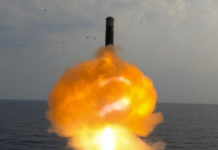New Delhi– Amid controversy surrounding the consumption of beef in India, a leading credit rating and research institution says the country’s export of buffalo meat over the next five years would reach close to Rs 40,000 crore.
“Over the next five years, Indian buffalo meat exports would reach close to Rs 40,000 crore at a compounded annual growth rate (CAGR) of 8 per cent,” ICRA said in its study on the Indian buffalo meat export industry.
“In the long term, ICRA expects buffalo meat exports to continue to report healthy growth, driven by improving infrastructure, a sizeable buffalo population the relatively lower price of Indian buffalo meat, and steady demand in the international market,” said Sabyasachi Majumdar, Senior VP, ICRA.
Indian buffalo meat exports have grown at a CAGR of 29 per cent from Rs 3,533 crore in 2007-08 to Rs 26,682 crore in 2015-16, accounting for approximately 20 per cent of the world’s total buffalo meat exports (in volume terms) and becoming the largest volume exporter of buffalo meat, overtaking Brazil and Australia, ICRA said.
It is noteworthy that India by and large exports only buffalo meat as opposed to other countries which export primarily beef.
“For the last two consecutive years, buffalo meat has been the highest agri-related export from India and its contribution to the total export revenue has almost doubled to 1.56 per cent in 2015-16 from 0.76 per cent in 2010-11,” it said.
“While India has been exporting buffalo meat for almost two decades; this industry has only gained momentum in the last decade. This can be attributed to multiple factors, such as – increasing demand from developing countries (like China, Vietnam, Thailand, etc), slaughtering method meeting the religious requirements of certain ethnicities, price competitiveness, high buffalo population, and low domestic consumption,” Majumdar said.
Within India, Uttar Pradesh accounts for the highest share (28 per cent) of the total buffalo population and has also emerged as the leading buffalo meat-producing state – housing around 60 per cent of the total standal-one slaughter houses, standal-one meat processing units and fully-integrated meat processing units, the study noted.
The buffalo meat industry is largely unorganised and fragmented in nature; and only moderately regulated. It also remains vulnerable to risks pertaining to social and political sensitivity, sustainability of buffalo population, disease outbreak risk and high competition from the global beef industry (this was evident in 2015-16 when the buffalo meat exports from India declined for the first time in almost a decade as depreciation of Brazilian currency made Brazilian beef exports more attractive).
Additionally in spite of the development over the past few years, there is considerable scope for improvement in the industry infrastructure, which lags the standards of some of the major global beef exporting countries.
However, the government is addressing these challenges by focussing on improving industry infrastructure through direct as well as through increased private sector participation, roll out of schemes to sustain the availability of buffaloes for slaughtering and developing a wider regulatory framework to ensure higher quality control. (IANS)






